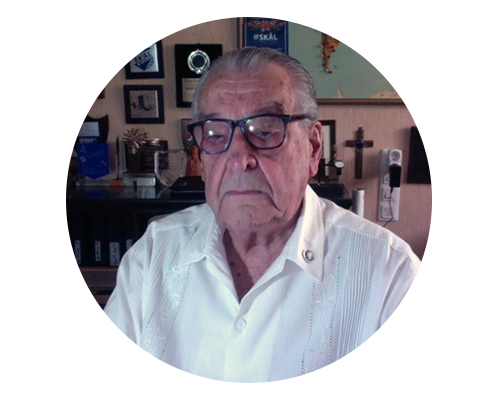Skål International History: 1937-1938
The Steering Committee's first meeting took place on 13 February at the Skål Club Headquarters in Paris.
The Association Internationale des Skål Clubs (AISC) was comprised of 25 Clubs.
This Headquarters, they remark, and the Paris Skål Club is needed; it is a place for conversation and rest for its members. They continue to give lectures. Hot meals are served, and it is then that the members realize the effort made. New friendships are created, and the great family of tourism is born. Present at that meeting were: De Lange, Hahndorff, Ith, Nieuwenhuys, Rouquero, Schoevaerts, Thiry, Volckaert, Waugh and Wilczek.
An assistant was hired for Ith, the Secretary, as he wanted to resign for health reasons. Only the delegate for each country will have the vote. An Advisory Commission of the Steering Committee was created, comprised delegates from Austria, Denmark, Finland, the Dutch East Indies, Luxembourg, and Norway. With this, they tried to ensure that all countries are represented within the governing body.
Possibly the seed for what is now the International Skål Council.
It is agreed that if members do not obtain free tickets for the Steering Committee meetings, the AISC will pay for the cheapest possible 2nd class ticket, the hotel and meals, and 10 Fr. F. per day for expenses. ‘Bon Vivants’ clubs are accepted as affiliate members of the AISC.
On 03 March, the President of the Skål Clubs of Germany wrote to Heinrich Jogger, from the Munich Conference and Exhibition Centre, telling him about Skål and the possible formation in that city. As was the custom of the time in Germany, he ends his letter with a Heil Hitler!
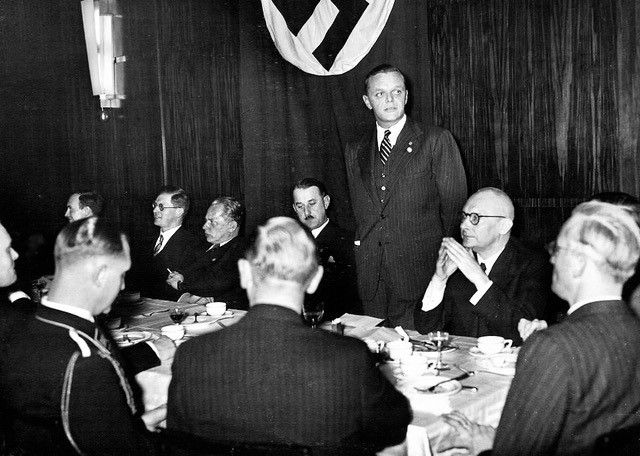
The following day, 04 March, Florimond Volckaert wrote to Dr. Ith, informing him that he will not submit his candidacy at the next congress, to say, "to see a personality at the head of Skål that helps its development and prosperity". He knew his capabilities full well.
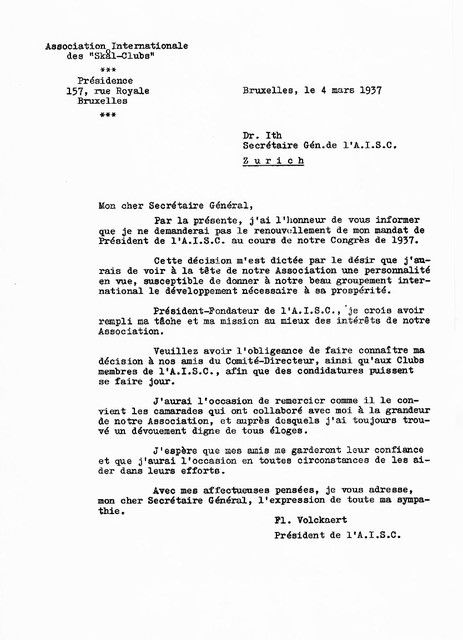
The 4th Congress of the AISC took place in Paris, from 22 to 25 April.
The Paris Skål Club made a tremendous effort. The collaboration of the Government of France, the Mayor of Paris, and the many transport companies was essential. It was attended by 148 congress members from 27 clubs from 13 countries. Comparing them with the 2,000 members at the time, the current percentages would lead us to figures that we have never achieved. But what would happen if everything or almost everything was free? Indeed we would have exceeded those percentages.
The cost of the congress, free for delegates and 50 Fr. F. for the rest of the participants.
The Steering Committee was formed by:
President: F. Volckaert.
Vice Presidents: C. C. Florman, W. H. E. Nieuwenhuys, L. Schoevaerts, R. Waugh, Dr. G. A. Wilczek.
Secretary-General: Dr. Arnold Ith.
Treasurer: W. H. De Lange.
Commissioners:
Press: Geo Thiry.
Travel: Victor Hahndorf.
Advertising: Paul Gache.
Accounts: Camille Mathez, and Crimes.
Alternate Members: Laurent Claes and Jean Monmarché.

On 22 April, the Official Opening at the Grand Hotel, under the Presidency of the General Commissioner for Tourism, Mr. Roland Marcel. Cocktail at the Palais D’Orsay. Lunch hosted by H. Lesieur, President of the Paris Skål Club. Cocktail at the Hotel Lutecia. Gala dinner hosted at the International Exhibition site by the General Commissioner Mr. Edmond Labbe. The next day, meeting of Delegates. Excursion and lunch at the Auberge Saint-Pierre, hosted by the Tourist Office and chaired by its President Mr. André Mariage. Visit the Castle. Gala Dinner and Dance at the Hotel Continental, hosted by the General Commissioner for Tourism and chaired by Mr. Rousselier, Councillor of State.
On the 23rd; Working session at the Grand Hotel, on Rue Scribe. Reception at the Headquarters of the Paris Skål Club. Historical Tourist Visit. Lunch at the Auberge Saint-Pierre in Dampierre, hosted by the Paris Skål Club, chaired by Mr. André Mariage, President of the Tourist Office, and Mr. Banlieue of the Transport Society. Excursion through the Chevreuse Valley and visit to the Dampierre Castle and Vaux de Cernay. Gala dinner at the Hotel Continental in Paris, hosted by the General Secretary for Tourism and Mr. Rousselier, Councillor of State, President of the Board of Directors of the National Centre for the Expansion of Tourism. Dance and Buffet.
On the 24th, meeting of Delegates and Closing Ceremony. Lunch at the Pavillon Dauphine, hosted by the Paris and France Hotel Association and chaired by Mr. Mollard. City Tour. Cocktail and Gala Dinner hosted by Air France and chaired by its General Director, Mr. Louis Allegre.
Finally, on the 25th, excursion to Orleans. They are scheduled as 'Skål Surprise Train.' Reception at the Town Hall and a Glass of Wine hosted by the Orleans Town Hall and the Tourist Office.
At that time, as has been said, the Paris Skål Club had its Headquarters, with a bar and a library, at 9 Rue Auber. That place had been created by all those interested in tourism. From Air France, British Airways, Lufthansa, K L M, Sabena, Swissair, General Transatlantique, Paquet, United States Lines, Casa de Portugal, ENIT, Austrian Tourism, Swedish Tourism, American Express, Federation of Travel Agencies, Railways, Wagons-Lits, Great European Hotels, etc. Everyone had collaborated, the importance of Skål was evident; they were professionals and promoted understanding between the different means of transport and the hoteliers. They were travel agencies, transport of any kind, and even hotels.
It was a period of consolidation.
The idea of Skål is only valid at the international level. "The Essence of the Skål Movement is its international character”.
The creation of an Internal Newsletter was approved as a basis for the contact between clubs and members. There was ‘Travel Topics’, in English, used as a public organ and mouthpiece. The Newsletter would be published in French, but it would publish articles in other languages. New clubs were created in Prague, Belgrade, and Milan.
Volckaert's idea of not submitting his candidacy was praised by all, they were happy with the idea of founding the AISC, and he was given the title of Founding President. As his successor, H. Lesieur was elected, with the modification of the Statutes, so that the President could be elected for one year only. They were trying to make way for new elements, and F. Volckaert tried to prevent his case from happening again. That spring, Hans Ortelius had visited New York and contacted ‘Les Bons Vivants’ in his capacity as ‘special envoy’ of the AISC.
"Membership of Skål is limited to leaders of travel and transport organizations. The objectives are to create and develop a spirit of unity and goodwill among all representatives of tourism". Charles Fisher, one of the founders of the London club, was also in the United States.
On 01 June, the Steering Committee met in Zurich. The President was Henri Lesieur of Air France, but the session was chaired by Volckaert, Secretary Dr. A. Ith of the Zurich Tourist Office, Treasurer W. H. De Lange of Rotterdam-Lloyd, Vice President W. Nieuwenhuys of KLM, Advertising H. A. Ostelius of S. A. L. and A. B. A. and F. Volckaert from W.L.C., Vice Presidents R. Waugh from Imperial Airways and Dr. G. A. Wilczek from Swisstours.
The first English commercial airline was Aircraft Transport and Travel Ltd., established in August 1919, with flights from London (Hounslow) - Paris (Le Bourget) with a De Havilland Airco, for two passengers. In 1924, it changed its name to Imperial Airways.
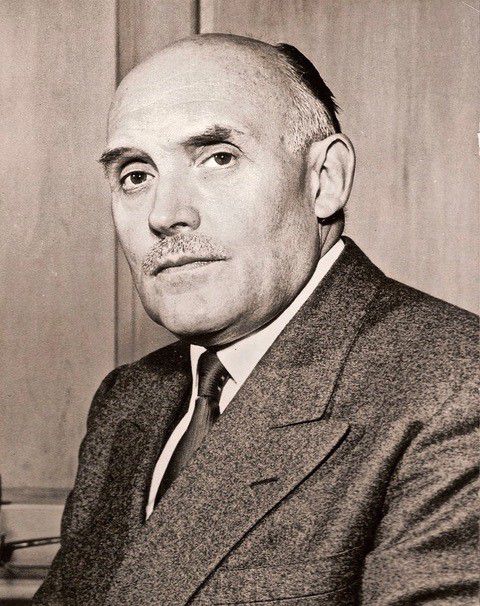
1936-1937 will be dedicated to internal organization and 1937-1938 to reinforce the power of the AISC.
Ith read out a letter from Lecoultre, President of FIAV (Fédération Internationale des Associations Vexillologiques), expressing gratitude for the invitation to attend the Committee meetings in Paris. It is noted that Fiav is no longer so hostile to the AISC, and it is agreed to invite them to the AISC congresses.
The AISC Steering Committee meets again, on 13 October, in the Foyer of the Paris Skål Club. H. Lesieur presided.
To put together the yearbook, there is a cost estimate from Zurich and another from Amsterdam. They ask why it is not done in Germany, and thus the debts that their clubs have due to currency problems are collected. The response is that it is much more expensive. The yearbook will not contain advertisements. Clubs will indicate the number of copies they want so that their price covers the costs. The cover will be in two languages, and the year will not appear so that it can be used for several years. It may be sold to third parties that request it, such as Transport Companies and Associations, but higher. Captain Florman ordered one hundred copies for Sweden and contributed 2,000 Fr. F. on behalf of A/B Aerotransport, Schoevaerts contributed 1,000 B. F. on behalf of Sabena. The Secretary-General believes that if the big clubs follow the examples of Sweden and Belgium, the circulation will be covered. The airlines interested in the yearbook followed suit because of the dissemination it represented and the possible contacts.
They fixed the price at 100 Fr. F. for Associations that wanted to belong to the AISC, such as the Cosmos-Club of Singapore, the Travel League of New South Wales in Sydney, and the Bons-Vivants of New York. The Secretary-General reported on the correspondence to create clubs in Barcelona, Belgrade, Bern, Budapest, Cairo, Chur, Danzig, Freiburg, Jerusalem (Palestine), Johannesburg, Prague, Rio de Janeiro, Rome, Tehran, and Warsaw. As there is no money for the President and the Secretary, the members of the Steering Committee who go to these cities will be in charge of following the conversations. Schoevaerts (Prague), Wilczek and Charles Fischer (Bon-Vivants, from New York), Ostelius (Brazil), etc. The quota increase was rejected by nine votes to two. The London Skål Club is still looking for funds to organize the 1938 Congress, it has not yet found them, and the Steering Committee is pressing it for this. The recommended date for this congress is 22-24 April 1938.
‘Travel Topics’ features Hans Ostelius about Skål and lists the Steering Committee by Country, City, Name and Company, Title, and Role.
On 03 November, a letter from A. Ith appointing Wilczek, then General Director of Swisstours of Lucerne, on a visit to the United States to discuss the possible association of the ‘Les Bons Vivants’ Club with the AISC. ‘Travel Topics’ gave an account of the visit and their conversations. The meeting took place at the George Washington Hotel, on 16 November. William Dunwoody from American Express was there, as President of the "Bon Vivants," as were Bart O'connell from Martín Travel Bureau, 1st Vice President, Joseph E. Terry of Raymond Withcomb, 2nd Vice President, Paul Boentgen from Chase National Bank as Secretary and Charles B. Bryson from Canadian Pacific as Treasurer. Both clubs had a similar sense. In his own words, Wilczek realized the importance of Skål, the members of which were prominent men within the tourism industry, having Ministers and Mayors among its members. Wilczek left Fisher to continue the collaboration negotiations.
The clubs held many activities. On 24 November, a Stockholm Skål Club Dinner and Dance, preceded by a conference. On 02 December, the Skål Club of Germany hosted a pressed tea at the ‘German Press Centre’. Winter, President of the Club, spoke about the ideology of Skål, and Mr. Esser, a former minister, spoke about international tourism in general.
Under the direction of Geo Thiry, as AISC Press Commissioner, the first issue of the Newsletter was released. The President of the AISC, H. Lesieur, also President of the Paris Skål Club, writes an ‘Open Letter from the President of the AISC" regarding Skål as a big family and the Newsletter as the best way to get to know each other and about club activities. ‘The Newsletter will reflect your submissions and not the work of a drafting committee’. The motto of the Newsletter will be ‘by Skålleagues, for Skålleagues’. He ends by asking for everyone's collaboration. An ‘Open Letter from the Secretary-General of the AISC’ is published below, talking about the expansion of Skål, the countries where it exists, and the interest aroused in the others. Appointment, as new friends of the ‘Amicale International de Tourisme’, to Belgrade, Budapest, and Prague clubs, which were being created. It also announces that Italy will be registered during the next London Congress, in April 1938. It mentions that the Singapore "Cosmos Club" was affiliated with the AISC two months prior and mentions the relationships maintained with North and South America, with Asia Minor, Palestine, and Egypt, with the Transvaal, and with Australia. Tourism, based on international relations, will have the element of union between countries within our association. The clubs will not be a group of friends who act independently but will do so to serve as a means of collaboration and union between tourism professionals. A letter from Geo Thiry, Press Commissioner, encourages everyone to write and explains that there are two press organs: ‘Travel Topics’ in English and this Newsletter in French.
On 18 December, and at a meeting of the Steering Committee at the Hotel Londres in Antwerp. Dr. Lad. Stern passed on to the Steering Committee a proposal from Dr. Gleissner, ‘Landeshauptmann van Oberosterreich’ which offers AISC members free stays at Kogl Castle the condition that the Skålleagues arrange for paying guests to stay at its 80-room castle. The offer of a free stay of seven days, for each stay of thirty days of payment.
The London Skål Club communicates through Waugh that it can invite delegates without their wives for a congress, but there will still be some time to wait. Dr. ITH presents a sample membership certificate. It is decided that each country submit a template.
Concerning the membership lists, the President will write to the Copenhagen Skål Club to carry out the decisions of the Assembly of Delegates, or it will be expelled from the AISC. Affiliated clubs, such as the ‘Cosmos Club’ will have the right to ‘Travel Topics’ at 1/3 of their cost per issue, their members will be able to attend AISC congresses at reduced prices, they will be admitted to the different Skål Clubs headquarters, they will always find help in their travels and good reception for personal or business issues, they will have the same rights as Skål members, except the right to vote and to elect, and the right to the dissemination of news through ‘Travel Topics’ and AISC circulars. They will have to pay 100 Gold Fr. as a one-time payment for registration fees.
Dr. Wilczek reports that he was in New York at an Assembly of 'Bons Vivants' and is not in favor of permitting them entry into the AISC. The Assembly was deplorable, and we must try to form an Skål Club in New York, with some personality from tourism. In this sense, it is written to the representative of the AISC in New York, Charles Fisher.
New clubs are created in Prague and Budapest. In Athens, Astasias Potamianos is entrusted with the recovery of this club. Oreste Buonomi writes supporting the creation of a club in Italy. In October, a club is created in Trondheim, chaired by L. A. Ottesen of Bennett's Travel Bureau A/S, counting 30 members.
The 5th congress in Zurich in 1939 is announced as ready. The seal for the 1938 card will be red. Price of 1 Gold Fr., equivalent to 65 Dutch cents. Germany's problems in paying its dues continued; it must have been since its foundation. The solution would be to entrust them with the lists of members for them to be able to collect the fees.
Dinner hosted by the Anvers Skål Club in honour of the International Association of Skål Clubs (AISC) Steering Committee (Amicale du Tourisme).
Hotel de Londres,
Saturday 18 December 1937.
Wines
Graves Supérieur, dry, 1929.
St. Emilion, Supérieur, 1929.
Moulin-à-Vent, 1923.
Pommery, brut, 1930.
Menu
Zeeland Imperial Oysters.
Consommé Ambassadeur.
Homard à la Newbourg.
Anvers sweetbread escalope.
Roast Bohemian pheasant.
Calville Apple Compote.
Strasbourg Foie Gras Parfait in an Aurore sauce.
AISC Bombe.
Moka cake.
--
The order of toasts is set.
Today, it would be impossible to present a similar menu due to the direction that the AISC has taken.
Most of the archives from 1938 and 1939 were lost.
The Secretary-General, Hans Ortelius, returned to Sweden at the outbreak of war and left them in London, but no one was assigned to look after them. A bombing destroyed the office, and two years of Skål's history were destroyed along with it. Two critical years that Wilczek tried to reconstruct with his private documents, but some of the essential minutes and documents were irretrievably lost. He also helped to rebuild the archives of George Thiry, who succeeded Ostelius as the General Secretary. In February 1938, "Travel Trade" published the decision of the AISC to found an Skål Club in New York. On 11 March, Austria is incorporated into the Third Reich, and the Vienna Skål Club is closed.
On 19 March, the Steering Committee meets in London at the Coq d'Or Restaurant. H. Lesieur presides, attended by Volckaert, Ith, Kirchgessner (instead of Winter), De Lange, Ostelius, Schoevaerts, Thiry, Waugh and Wilczek. Florman, Hahndorff, Nieuwenhuys, Wilhelm and Winter are absent. It deals first with the delegates of the London Congress, although it was the fourth point. The London Club will try to extend the congress member's stay for one more day.
The German delegate, Kirchgessner, makes the following statement, but not without first explaining that it is not his position and regrets having to read this text:
"The Skål Club of Germany has had friendly relations with all Skål Clubs in all countries. Its work for the ideals of Skål, both inside and outside the borders of Germany, was inspired by friendly collaboration and the desire for the fruitful development of the AISC. Unfortunately, however, the Skål Club of Germany must note that the AISC members include Jews. This fact will make reciprocal relations difficult and prevent the Skål Club of Germany from collaborating with the AISC in the future. Consequently, the Skål Club of Greater Germany submits the following proposal: The Assembly of Delegates that will take place in London on 22 and 23 April, will deal with the exclusion of Jews from the AISC and the introduction of a racial clause in its Statutes".
Nazi ideas compelled all German subjects and all people. I believe that reading that text must have been very hard for the delegate from the Skål Club of Germany. The dark shadow of war was already looming, even within our Skål. Given the proposal, the Steering Committee asked Kirchgessner to leave the room. It took the resolution, after lengthy discussions, that if the German clubs did not withdraw this proposal, Article 9 of the Statutes would be applied, as the proposition was contrary to the ideals of Skål.
Dr. Ith tendered his resignation as Secretary-General. Schoevaerts nominated Thiry and Wilczek as candidates. Kirchgessner thought a secretary should be paid.
When defining who were active members, it was considered that hoteliers should be passive members and that their quota should be higher. The expulsion of Copenhagen from the Skål Club was decided if the list of members was not delivered before the Assembly of Delegates.
The 6th International Congress of the AISC took place in London, from 21 to 24 April.
Twenty-nine clubs attended from 15 countries. Congress had great official support. The Lord Mayor of the city chaired the London Skål Club. The published program was simple, beginning with a welcome letter, dated 31 March, and signed by Lord Derby, President of the Travel & Industrial Development Association. "Through travel comes understanding, and through understanding comes peace...". The congress was made possible thanks to the assistance provided by sponsors. I think the investment they made then and their faith in tourism were significant.
Shipping Companies: Anchor Line Ltd., Canadian Pacific Steamship Co., Cunard White Star Ltd., Elder Dempster Lines Ltd., French Line, Norddeutscher Lloyd Ltd., Orient Line, Royal Mail Line, Swedish American Line, United States Lines.
Railroad Companies: Canadian National Railways, Great Western Railway,
London & North Eastern Railway, London Midland & Scottish Railway, Southern Railway.
Airlines: A.B. Aerotransport, Air France, British Airways, Deutsche Lufthansa, Imperial Airways Ltd., Royal Dutch Airlines, Sabena, Swissair.
In addition to Authorities, Hotels, Theatres, Road Transport, Gifts, Recordings…
The Organising Committee:
President: The Right Honourable Sir Twyford, Lord Mayor of London.
Honorary President: Sir George Broadbridge.
Chairman: R. Waugh.
Vice-Chairman: H. Ostelius.
Secretary-General: W. H. Knott.
Honorary Treasurer: J. V. Howard.
Honorary Solicitor: K. Staple.
Representatives: R. Bernard, W. E. Gilks.
Advisers: J. Bamford, W. Barton, A. R. Bennett, J. O'neil Fisher, J. W. Frame, W. De Jongh, B. H. Russell, R. Smyrk, A. C. Taylor.
Congress Secretary: J. A. Latty.
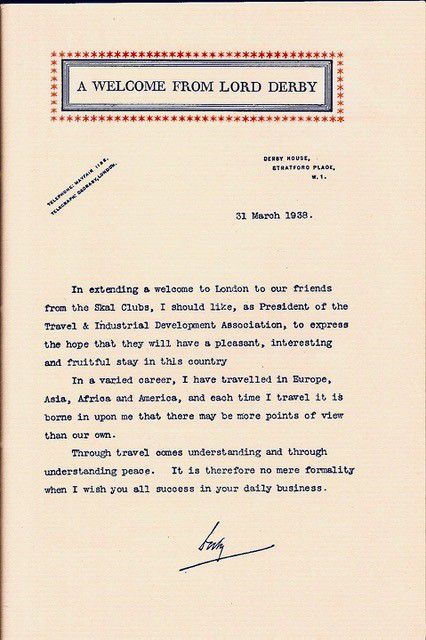
On the first day, they had dinner at the hotels, and then they went to the theatre optionally, with tickets gifted by the different theatres in London. On the second day was the Opening Ceremony, presided over by the Mayor of London. Then work sessions, lunch at the Holborn Restaurant, and Dinner - Dance at the Savoy Hotel in the evening. On the third day, work sessions with lunch at Dorchester. For companions, different optional tours, free rail travel, throughout Great Britain.
On 22 April, the London Skål Club hosted a lunch at the King's Hall Rooms, Holborn Restaurant. The toasts were to 'The King', 'Sovereigns and Heads of State represented in the Court of His Majesty', and 'Our guests'. Dinner 'in amiticia' at the Hotel Savoy.
On 23 April, lunch at Dorchester was hosted by British Airways Ltd.
If anyone is interested in the menus, they can request them.
‘Travel Topics’ published a special supplement for this congress, in tribute to the men of tourism who promoted friendship between peoples.
In the archives of the AISC General Secretariat, this special issue gives an account of the congress, the Inaugural Ceremony, and the speeches given. "It is gratifying, said the Lord Mayor of London, to know that 12 countries and 28 cities are represented here". His entire speech was dedicated to the tourism industry, professionals, their work, and the idea of promoting tourism and friendship between people. Tourism Industry Authorities spoke about Skål. The Duke of Kent was mentioned. In a speech with the tourism, authorities called them ‘the invisible export’. Gala Dinner at the Savoy, hosted by Imperial Airways, the ‘Farewell Lunch’ at the Dorchester, hosted by British Airways.
Two hundred delegates were invited to this congress, but as fewer than expected attended, the remaining seats were given to congress members. The delegates paid 12 shillings, and the congress members paid 1 pound and 7 shillings. Antwerp, Basel, Batavia, Berlin, Brussels, Budapest, Copenhagen, Côte d'Azur, Finland, Geneva, Interlaken, Lausanne, London, Lucerne, Lugano, Luxembourg, Montreux, the Netherlands, Norway, Paris, Prague, Sweden, Vienna, and Zurich were represented. The Skål Clubs of Auckland, Belgrade, Cairo, Chicago, Danzig, Jerusalem, Johannesburg, New York, Rio de Janeiro, and Tehran were formed. The Malaysian Cosmo-Club of Singapore was listed as an affiliate member.
On 05 April, the following letter was received: "In an extraordinary session of its directors, held on 04 April 1938, the management of the Skål Clubs of Germany has decided upon the immediate dissolution of the Skål Club of Germany, and as a result, it submits its resignation to the AISC. We communicate this for your information".
From 09 to 12 June, the Steering Committee meets in Namur. The members of the Steering Committee arrived in Brussels and were summoned to the Hotel Scheers on Boulevard Adolphe Max. Aperitif at the Hotel, hosted by the Brussels Skål Club, and departure by train to Namur. Dinner and accommodation at the Hotel des Comtes D’Harscamp. They had the meetings on the 10th, with lunch hosted by the Hotel, and then they took some excursions and tours, along with a series of receptions. Lunch at the Hotel des Comtes d’Harscamp in Namur.
On the 11th, dinner presided by Mr. Huart, Mayor of Namur, hosted by Mr. Robert Peeters, owner of the Hotel des Comtes d'Harscamp at the Skål Clubs of Belgium, on the occasion of the visit of the AISC Steering Committee. On the 12th, reception in honor of the AISC, organized by the Casino de Namur.
On 23 September, the Steering Committee met in Liège. The Munich crisis in the Autumn passed, and the tourist industry let out a sigh of relief. The local press includes the importance of Skål in an article, which it considers to be an "International Association that includes all the organizations that deal, however closely or distantly, with tourism, travel, hospitality, etc.". The Skålleagues were honored at the Exhibition of 1939; F. Volckaert said, "The purpose of our association is to group all the organizations across borders that deal with transport, railways, travel agencies, hospitality, and tourism. We are distributed across 18 countries, and we hope to expand further because all work done to unite humanity and make all races understand men of heart will well receive one another".
There was a proposal for the creation of an Insurance Fund. It was conceived following a Skålleague from Austria who had to prove that he had means of support to leave the country. Being unable to use the AISC funds, as it was against the Statutes, a letter was written to all the clubs explaining the case and requesting the formation of an Insurance Fund. While this was accomplished and the Skålleague found employment in London, the AISC will bear his expenses.
I believe that this case was the origin of the Welfare Fund, later better known as the Florimond Volckaert Fund.
On 24 September, meeting of the Steering Committee in Liège, chaired by F. Volckaert, with Nieuwenhuys, De Lange, Schoevaerts, Thiry, Ith, Wilczek, Ostelius and Manz. Waugh had to return. They remark that the Scandinavians on the Committee have never attended the meetings. Therefore, they made the following decision: G. Thiry asked about the destination of AISC funds in the event of war. The following decision was made: "De Lange will deposit the funds in the Dutch National Bank of Rotterdam, and in the event of any eventuality, he will have carte blanche to move them”.
